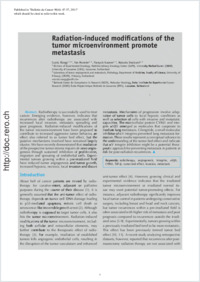Radiation-induced modifications of the tumor microenvironment promote metastasis
- Rüegg, Curzio Division of Experimental Oncology, Multidisciplinary Oncology Center, University Medical Center, University of Lausanne, Switzerland - Laboratory of tumor angiogenesis and metastasis, Pathology, Department of Medicine, Faculty of Science, University of Fribourg, Switzerland - National Center for Competence in Research, Molecular Oncology, ISREC-EPFL, Lausanne, Switzerland
- Monnier, Yan Division of Experimental Oncology, Multidisciplinary Oncology Center, University Medical Center, University of Lausanne, Switzerland - National Center for Competence in Research, Molecular Oncology, ISREC-EPFL, Lausanne, Switzerland
- Kuonen, François Division of Experimental Oncology, Multidisciplinary Oncology Center, University Medical Center, University of Lausanne, Switzerland - National Center for Competence in Research, Molecular Oncology, ISREC-EPFL, Lausanne, Switzerland
- Imaizumi, Natsuko Division of Experimental Oncology, Multidisciplinary Oncology Center, University Medical Center, University of Lausanne, Switzerland - National Center for Competence in Research, Molecular Oncology, ISREC-EPFL, Lausanne, Switzerland
-
2011
Published in:
- Bulletin du Cancer. - 2011, vol. 98, no. 6, p. 47-57
English
Radiotherapy is successfully used to treat cancer. Emerging evidence, however, indicates that recurrences after radiotherapy are associated with increased local invasion, metastatic spreading and poor prognosis. Radiation-induced modifications of the tumor microenvironment have been proposed to contribute to increased aggressive tumor behavior, an effect also referred to as tumor bed effect, but the putative mechanisms involved have remained largely elusive. We have recently demonstrated that irradiation of the prospective tumor stroma impairs de novo angiogenesis through sustained inhibition of proliferation, migration and sprouting of endothelial cells. Experimental tumors growing within a pre-irradiated field have reduced tumor angiogenesis and tumor growth, increased hypoxia, necrosis, local invasion and distant metastasis. Mechanisms of progression involve adaptation of tumor cells to local hypoxic conditions as well as selection of cells with invasive and metastatic capacities. The matricellular protein CYR61 and integrin αVβ5 emerged as molecules that cooperate to mediate lung metastasis. Cilengitide, a small molecular inhibitor of αV integrins prevented lung metastasis formation. These results represent a conceptual advance to the understanding of the tumor bed effect and indicate that αV integrin inhibition might be a potential therapeutic approach for preventing metastasis in patients at risk for post-radiation recurrences.
- Faculty
- Faculté des sciences et de médecine
- Department
- Médecine 3ème année
- Language
-
- English
- Classification
- Biological sciences
- License
-
License undefined
- Identifiers
-
- RERO DOC 28482
- DOI 10.1684/bdc.2011.1372
- Persistent URL
- https://folia.unifr.ch/unifr/documents/302140
Statistics
Document views: 123
File downloads:
- pdf: 267
